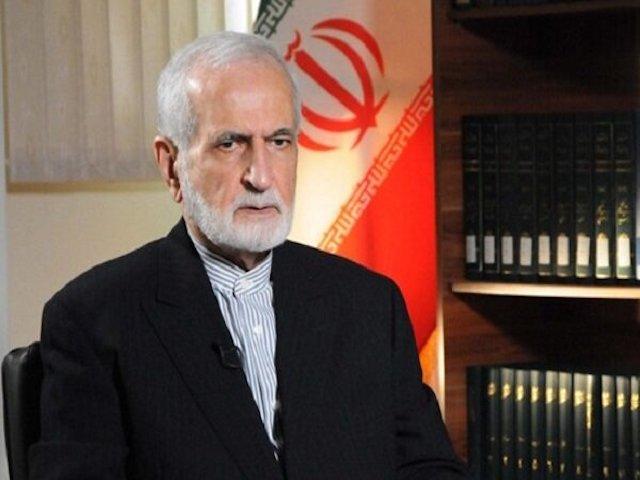In a brazen display of aggression, Amir-Ali Hajizadeh, the commander of the Aerospace Division of the Islamic Revolutionary Guard Corps (IRGC), recently boasted about Iran’s readiness to launch another massive missile attack on Israel. His statements underscore Iran’s unrelenting hostility and the growing volatility in the region.
Operation True Promise: A Precursor to Future Attacks
Reflecting on Iran’s audacious assault on April 13, Hajizadeh declared, "In Operation True Promise, we unleashed 300 missiles at Israel. Our eagerness for a follow-up, Operation True Promise 2, is palpable, and I cannot yet determine how many missiles we will employ." This rhetoric highlights Iran's unyielding commitment to its antagonistic agenda.
The original Operation True Promise marked Iran's first direct missile strike on Israeli territory, involving an unprecedented barrage of over 350 drones and missiles. Despite Iran's aggressive efforts, the Israeli military, supported by a coalition led by the United States, successfully intercepted 99% of these projectiles, demonstrating a robust defense capability.
IRAN THREATENS LARGE ISRAEL ATTTACK
— Shiri_Sabra (@sabra_the) July 1, 2024
Amir-Ali Hajizadeh, commander of the Revolutionary Guards Air Force, met today in Iran with the families of Hamas terrorists who were killed in the war and stated; “We look forward to carrying out Operation ‘True Promise 2 in Israel’” pic.twitter.com/z5dC4pR4WP
Retaliation and Continued Hostility
The April attack was ostensibly a retaliatory measure for an alleged Israeli strike on the Iranian consulate in Damascus, which resulted in the deaths of seven IRGC officers, including a senior commander. Hajizadeh’s speech reaffirmed Iran's ongoing support for militant groups across the region, such as Hezbollah in Lebanon and Hamas in Gaza. "Our allies in Palestine, Lebanon, and other regions are well-equipped with Iranian weaponry, showcasing our steadfast support," he asserted.
Historical Aggressions as a Warning
Hajizadeh also referenced two significant IRGC attacks as evidence of Iran's deterrent capabilities. In 2019, Iran downed a US military drone, claiming it was on a reconnaissance mission over Iranian territory, while Washington insisted the drone was in international airspace. Another notable incident occurred in 2020, when the IRGC launched over a dozen ballistic missiles at the Al Asad Airbase in Iraq, in retaliation for the assassination of IRGC commander Qassem Soleimani by a US drone strike.
Escalating Threats and Regional Implications
The threat of another Iranian missile barrage is not an isolated concern. Kamal Kharrazi, foreign affairs adviser to Iran’s Supreme Leader Ayatollah Ali Khamenei, warned that an Israeli offensive against Hezbollah could trigger a regional war. "If Israel attacks Hezbollah, it risks igniting a conflict that will engulf the entire region, with Iran and the axis of resistance fully backing Lebanon," Kharrazi cautioned.
Iran would use ‘all means’ to back Hizbollah if Israel launches full-blown war.
— War Intel (@warintel4u) July 2, 2024
Kamal Kharrazi, foreign affairs adviser to Iran's supreme leader, warned that a full-scale Israeli offensive against Hezbollah could trigger a regional war.
He stated that Iran would support… pic.twitter.com/IojOHA1yaM
He stressed that Iran is not seeking a regional war but would have no choice but to support Hezbollah militarily if necessary. "The expansion of war is not in anyone’s interest," Kharrazi said, emphasizing the potential for widespread conflict.
Rising Tensions and Global Repercussions
Tensions between Iran, Israel, and the United States have been on the rise since Hamas’s attack on October 7 and Israel’s subsequent offensive in Gaza. Iranian-backed militant groups have increasingly targeted both Israeli and US forces in the region, exacerbating the already volatile situation.
The situation remains perilous as both sides have engaged in tit-for-tat missile strikes, with Iran launching its first direct attack on Israeli soil in April. While these exchanges have been relatively contained, the potential for escalation looms large, particularly as regional actors like Hezbollah and the Houthis in Yemen continue their aggressive posturing.
Political Uncertainty and Future Prospects
Amid this backdrop of military tension, Iran is preparing for a pivotal presidential election following the death of President Ebrahim Raisi in a helicopter crash. The upcoming run-off pits reformist Masoud Pezeshkian against hardliner Saeed Jalili, with significant implications for Iran’s foreign policy.
Regardless of the election outcome, Kharrazi assured that Iran’s overarching strategy, as dictated by Supreme Leader Khamenei, would remain steadfast. He hinted at possible openings for renewed dialogue with the West, contingent on a mutual shift in policies and a return to negotiations based on respect and equality.
And the truth shall set you free❗️
— יוסף חדאד - Yoseph Haddad (@YosephHaddad) April 13, 2024
The Islamic republic of Iran never cared about the Arabs or Al Aqsa or Jerusalem...while the regime's missiles target al Aqsa as you see in the video it is Israel that is intercepting them and keeping the Al Aqsa mosque safe.
Keep this in mind… pic.twitter.com/8IoKEdsAuD
Conclusion
As Iran continues to flex its military muscles and issue dire threats against Israel, the international community watches with bated breath. The potential for widespread conflict remains high, with regional stability hanging in the balance. The path forward will require careful navigation to avoid further escalation and ensure a fragile peace is maintained.


